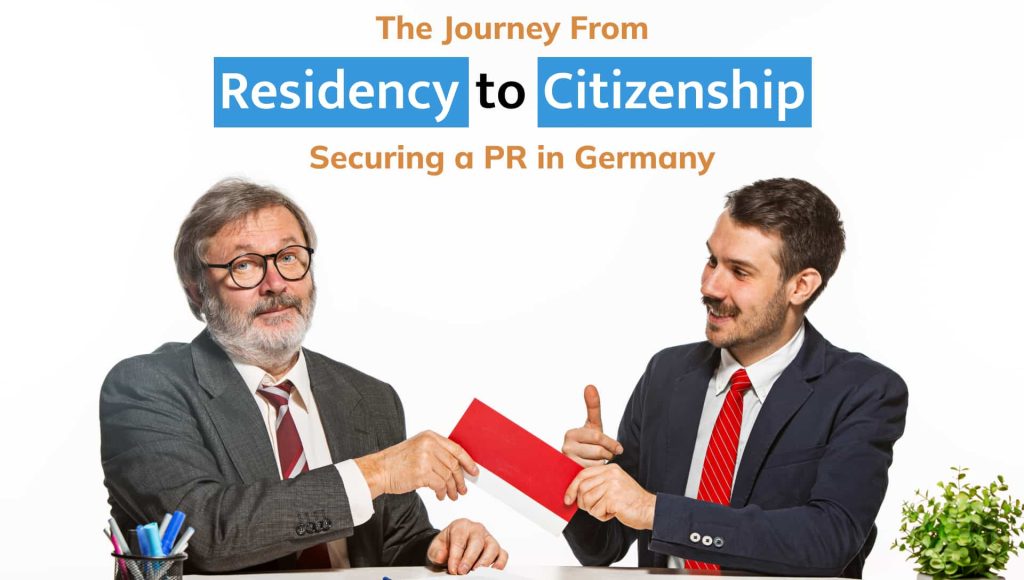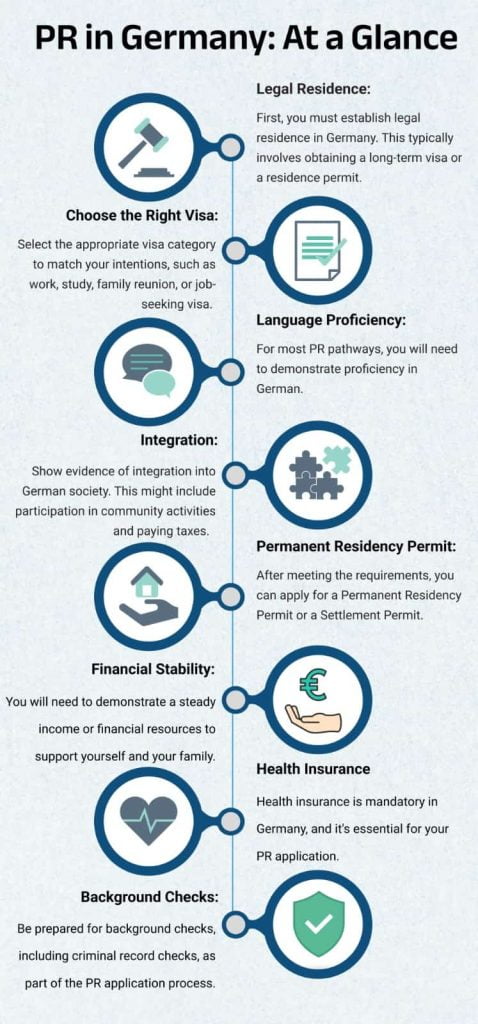
Have you ever dreamt of calling the picturesque landscapes of Germany your permanent home? Whether you’re captivated by the stunning Bavarian Alps, the bustling streets of Berlin, or the quaint villages along the Rhine, securing permanent residence in Germany can turn that dream into a reality. But, how do you go about making it your new forever home? What are the steps, the hurdles, and the stories of those who’ve successfully embarked on this life-changing journey?
Allow us to unravel the intricacies of the process, offering you a roadmap to navigate the German bureaucracy with ease. Have you wondered about the eligibility criteria, the required documents, or the integration measures? Curious about the diverse experiences of individuals who have already achieved permanent residence status? We’ve got you covered with all these answers and more.
So, if you’re considering planting roots in this vibrant European nation, read on to discover the secrets of finding a home in Germany. Your German dream awaits, and we’re here to guide you every step of the way.
What are the Key Differences Between Temporary vs. Permanent Residence in Germany?
| Feature/Characteristics | Temporary Residence | Permanent Residence |
| Duration/Validity | Limited (usually 1-3 years, can be extended) | Unlimited |
| Purpose | Specific (e.g., study, work, job-seeking) | General, without a specific purpose |
| Employment Restrictions | Might be tied to a specific job or field | No restrictions; can work anywhere |
| Travel | Free movement in the Schengen area | Free movement in the Schengen area |
| Eligibility for Social Benefits | Limited based on the permit type | Full access |
| Family Reunification | Possible, but with certain conditions | Easier, with fewer restrictions |
| Path to Citizenship | Provides a starting point | Accelerates the path |
| Language Proficiency Requirements | Depends on the reason for stay | Requires basic German language communication skills. |
| Requirement for Renewal/Extension | Yes, based on the purpose of stay | Not required |
| Protection Against Expulsion | Minimal Protection | Strong protection |
What Does Basic Eligibility Criteria for Permanent Residence Look Like?
There are a few basic, non-negotiable facts and considerations to apply for a permanent residence in Germany:
- Length of Residence: To be eligible for permanent residence in Germany, you generally need to have lived in the country for a certain number of years. The typical requirement is five years of continuous residence, but this can vary based on individual circumstances.
- Residence Permit Type: You must have held a valid residence permit during your time in Germany. This means that you should have initially moved to the country for a specific purpose, such as work, study, or family reunion, and maintained lawful residence throughout your stay.
- Financial Stability: Demonstrating financial stability is crucial. You need to prove that you can support yourself and your family without relying on social welfare benefits. This often involves providing evidence of a stable income or savings.
- Sufficient Living Space: German authorities also require applicants to have adequate living space. This means your accommodation should meet certain size and quality standards, ensuring that you and your family have suitable living conditions.
- Integration Measures: You might be required to participate in integration courses and demonstrate a certain level of proficiency in the German language. This is to encourage social and cultural integration.
- No Criminal Record: Having a clean criminal record is a fundamental requirement. Applicants with a history of serious criminal activities may not be eligible for permanent residence.
- Exceptions and Special Cases: Certain individuals, like highly skilled professionals or refugees, may have alternative pathways and reduced residency requirements.
It’s important to note that these criteria may change over time or vary based on your specific circumstances, so it’s essential to consult with the relevant German authorities or immigration experts to understand the most up-to-date and personalized eligibility requirements for your permanent residence application.
Also read: A Must-Have Guide On Accident Insurance in Germany

The Blue Card Path To Obtain Permanent Residence in Germany: Unlocking Fast-Track Benefits
For highly skilled professionals and non-EU nationals seeking to secure permanent residence in Germany, the EU Blue Card offers a fast-track route that’s particularly appealing. Here’s why:
- Reduced Residency Requirement: The EU Blue Card holders can apply for permanent residence after just 21 months of working in Germany. If you demonstrate advanced German language skills, you can even shorten this period to 18 months.
- Expedited Integration: The Blue Card encourages language proficiency and integration, making it easier to meet the language requirements for permanent residence.
- Family Reunion: Your immediate family members can join you in Germany and benefit from the same accelerated path to permanent residence.
- High Demand Occupations: The Blue Card is often granted to those in high-demand professions, ensuring you’re well-positioned for a successful career in Germany.
- European Mobility: Beyond Germany, the Blue Card also provides the opportunity to work and live in other EU member states, opening doors to broader international experiences.
The EU Blue Card not only simplifies your journey to permanent residence but also enhances your career prospects in Germany and across the European Union.

Application Process: Navigating the Path to Permanent Residence
Applying for permanent residence in Germany is a significant step in your journey to making this vibrant country your long-term home. The process involves several key components, including document submission, fees, and interaction with the Ausländerbehörde (Foreigners’ Authority). Here’s a closer look at what to expect:
Document List:
- Application Form: Start by completing the relevant application form for permanent residence. This form can typically be obtained from the local Ausländerbehörde or downloaded online.
- Valid Passport: Ensure your passport is valid and includes any necessary visas and entry stamps.
- Residence Permit: Include your current or expired residence permit as proof of your legal residence in Germany.
- Biometric Photos: Provide recent biometric passport-sized photos that meet the specific German requirements.
- Proof of Financial Stability: Documents demonstrating your financial stability, such as employment contracts, payslips, or bank statements, are essential. These confirm your ability to support yourself and your family.
- Housing Confirmation: You’ll need a rental agreement or proof of suitable housing that complies with German standards.
- Language Proficiency: If applicable, provide evidence of German language proficiency, as this is a vital integration component. Language certificates or course completion certificates are typically accepted.
- Clean Criminal Record: Include a certificate from your home country and, if necessary, one from the German authorities confirming you have no criminal record.
Fees:
The fees for the permanent residence application can vary depending on your individual circumstances and the region of Germany you are applying in. Typically, fees can range from €135 to €260. Be sure to check with your local Ausländerbehörde for the specific fee applicable to your situation.
Engagement with the Ausländerbehörde:
The Ausländerbehörde plays a central role in the permanent residence application process. Here’s how you’ll interact with them:
- Submission: Schedule an appointment with your local Ausländerbehörde to submit your application and documents. They will review your application and inform you of any additional requirements.
- Interview: In some cases, you may be required to attend an interview, particularly if there are specific questions or concerns about your application.
- Waiting Period: After submitting your application, there will be a waiting period while the authorities review your case. This period can vary, but it’s typically several months.
- Notification: Once your application is approved, you will receive an official notification from the Ausländerbehörde.
Also consider reading: New To Living In Frankfurt? Here’s Your Must-Have Guide

Family Reunification: Bringing Loved Ones to Germany
One of the most heartwarming aspects of securing permanent residence in Germany is the opportunity it affords for family reunification. If you’ve made Germany your home and are eager to have your loved ones join you, here are the basics of how this process works:
- Eligible Family Members: You can typically bring your spouse, registered partner, and dependent children under the age of 18 to Germany. In certain cases, adult children or other family members may also be eligible.
- Financial Requirements: As the sponsor, you need to demonstrate your ability to financially support your family members. This includes having suitable housing and means to cover their living expenses without relying on public funds.
- Language Proficiency: Family members may be required to meet specific language requirements depending on their age and the type of visa they are applying for.
- Residence Permit: Your family members will typically apply for a family reunion visa at the German embassy or consulate in their home country. Once in Germany, they can obtain a residence permit that allows them to live and work in the country.
- Processing Time: The processing time for family reunion visas and residence permits can vary, so it’s advisable to start the application process well in advance of your desired reunion date.
From Residency to Citizenship: The Pathway to German Citizenship
Securing permanent residence in Germany is a significant milestone, but for many individuals, it’s just one step on a longer journey toward full integration and belonging. The connection between residency and potential citizenship in Germany is a vital consideration for those seeking to call this country their forever home.
- Residency as the Foundation: Permanent residence, often achieved after five years of legal and continuous residency in Germany, provides a strong foundation for building a life in the country. It offers stability, access to social benefits, and the freedom to live and work without the constraints of a limited-term visa.
- Pathway to Citizenship: While permanent residence is a pivotal achievement, it’s important to note that it isn’t the final destination for many. German citizenship represents the highest level of integration and involvement in the country’s civic and social life. The path to citizenship typically involves additional years of residence, language proficiency, and the absence of a criminal record.
- Benefits of German Citizenship: Becoming a German citizen opens doors to numerous benefits, including the right to vote, the ability to apply for certain government jobs, and the freedom to travel on a German passport. Moreover, German citizenship grants individuals a sense of belonging and full participation in the rich tapestry of German society.
Navigating the transition from residency to citizenship is a significant decision, and the specific requirements may vary based on individual circumstances, such as nationality, legal status, and family ties.
Finding A Space That is Your Own in Germany
Germany’s doors are open, and its embrace is warm, welcoming those who wish to make it their forever home. Whether you’re drawn to the vibrant cities, the idyllic countryside, or the unique blend of tradition and innovation, this nation offers a diverse tapestry of experiences and opportunities.
As you navigate the eligibility criteria, the EU Blue Card fast track, the application process, and family reunification, remember that this journey is not just about paperwork and visas; it’s about building a life, creating memories, and embracing a new culture.
To truly make this process a breeze, you will need the perfect housing solution in Germany. Urban Ground offers several options including shared and regular flats and studio apartments for rent in Berlin and other cities in Germany. Make sure to reach out to them today!
From residency to potential citizenship, your story in Germany is a narrative of integration, opportunity, and the pursuit of happiness.




